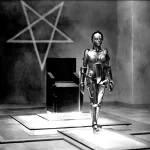Monday Movie: The Desperate Hours, by David Bax
There has been no shortage of American films about the darkness hidden beneath the picturesque façade of our suburbs. From Blue Velvet to The ‘Burbs to American Beauty and beyond, we’ve been quick to paint these towns and neighborhoods as a weak glamour that barely hides the psychoses and dangers from which they pretend to offer an escape. What’s amazing, though, is how quickly we seemed to arrive at these conclusions. The suburbs as we know them are essentially a post-World War II creation and cinematic deconstructions of them began to appear almost immediately, in crime films like André de Toth’s Pitfall, in which a bitterly unhappy man returns at the end of every soulless work day to an idealized version of home and a family he increasingly can’t stomach and in comedies like Frank Tashlin’s The First Time, in which young newlyweds discover that starting a family is no walk in the park.
William Wyler’s The Desperate Hours takes a different approach. There’s no seething resentment or pathology lurking in the characters who live on this quiet suburban street. No, the only thing they’ve done wrong is assume they were safe from the city’s ravages of crime. Fredric March plays Mr. Hilliard, the patriarch of a family who are victims of home invasion/hostage situation when Humphrey Bogart’s Glenn Griffin and his gang break in to hide out from the police. Wyler contrasts the idyll of the Hilliard’s quaint street (the exterior shots used the same house that would later be the Cleavers’) with the creeping moral rot brought by the criminals inside. In The Desperate Hours, as in the suburbs, the illusion of safety only goes so deep.































